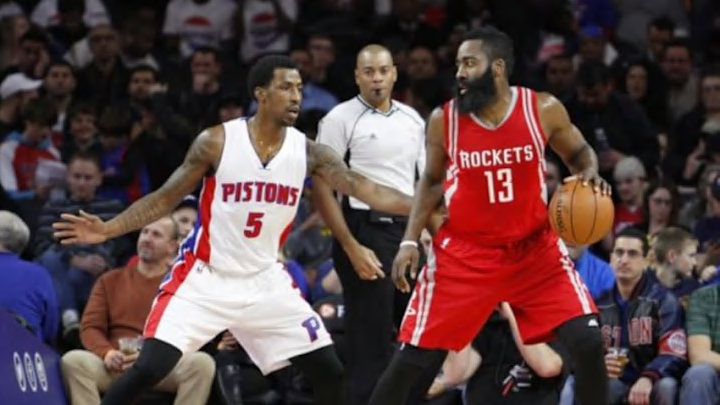The Detroit Pistons have surprised observers in ways both good and bad so far this season. They have had an up-and-down start, but their one constant is their defense.
The Detroit Pistons have alternately pleased and disappointed fans this season. They got off to an absurd 5-1 start, and then came crashing back to earth losing eight of their next 11 games. It’s already been a season full of highs and lows for the 10-9 Pistons, with wins over four of the current top six teams in the Eastern Conference, and losses to the lowly Brooklyn Nets and Los Angeles Lakers.
As I outlined previously, the Pistons offense is among the league’s least productive, but there has to be a counterbalance when you can’t score but you’re a game over .500 a month into the season.
That counterbalance is the Piston defense.
The Pistons feature the NBA’s 11th-best defensive rating, giving up 99.9 points per 100 possessions. There are a few reasons the Pistons are effective on defense.
The first and easiest to see is that Andre Drummond is an expansive force in and around the paint. He has a NBA-best defensive rebound rate of 36.4 percent, leading to the obvious conclusion that more than when the offense puts up a shot, more than one-third of the time Andre Drummond himself squelches the possession and turns the ball around for the Pistons.
More from Pistons News
- Which Detroit Pistons could save Team USA in the Olympics?
- Detroit Pistons could have major roster churn after 2023-24 season
- The best Detroit Pistons to wear each uniform number
- Full Detroit Pistons NBA 2K24 ratings
- Detroit Pistons: Who will sign the remaining NBA free agents?
Limiting second-chance opportunities is essential, especially when you have as hard a time scoring as the Pistons tend to this season, with their offensive rating of 99 points per 100 possessions.
The second reason, no less important although harder to spot, is perimeter defense.
A concept first introduced to me in a post by Seth Partnow of Nylon Calculus earlier this year illustrated the point that the best way to defend a three-pointer is to make sure that the three-pointer is never taken in the first place.
Logically, a three-pointer is a shot loaded with variance. While a three-point shooter with a percentage of 40 percent will over time make roughly that same 40 percent, oftentimes whether a specific shot actually goes in the basket from long range is simply luck-based. The defense can certainly affect that result to some degree, but generally speaking three-pointers are shots that are taken in rhythm, with the shooter open enough to actually get a shot off and over the closest defender.
That last point is the most important, in that typically the closer the defender is to the shooter, the less likely that shot is to be taken in the first place.
Smart teams have been aware of this fact for some time. In each of the past three seasons, the San Antonio Spurs have given up the fewest three-point attempts in the NBA. Needless to say, that’s not because teams are excited to attack the paint and deal with Tim Duncan down low. Low three-point attempts given up is a solid indicator of responsible defense.
This season, the Pistons are sixth in the NBA in fewest three-point attempts given up per game with 21.5, behind only the Golden State Warriors, San Antonio Spurs, Utah Jazz, Cleveland Cavaliers and Philadelphia 76ers.
Aside from the oddball Sixers, you may be noticing a trend in outstanding defenses taking the lead in this category.
So, just why are the Pistons near the top of the heap in responsible perimeter defense? The answer may not surprise you.
More from PistonPowered
- Which Detroit Pistons could save Team USA in the Olympics?
- Detroit Pistons could have major roster churn after 2023-24 season
- The best Detroit Pistons to wear each uniform number
- Full Detroit Pistons NBA 2K24 ratings
- Detroit Pistons: Who will sign the remaining NBA free agents?
Kentavious Caldwell-Pope has been making waves on defense. After giving Golden State’s Stephen Curry one of his toughest nights earlier this season, holding him to 22 points on 7-for 18 shooting, he went out and destroyed Dwyane Wade of the Miami Heat a week ago in a 104-81 win, holding him to two points on 1-for-9 shooting.
KCP’s length is a serious problem for offenses. He has been handling opposition lead scorers, and according to stats.nba.com he is giving up the eighth best field goal percentage of all players who have defended an average of ten field goal attempts per game or more. He’s yielding just 39.6 percent, and he’s doing this every night against the opposition’s primary scorer.
Furthermore, he has a percentage point differential of -3.2, which is the difference between the field goal percentage of the player he is guarding and the field goal percentage he is allowing his opponent to hit. The aim is to have a differential with a negative value, as it is less than your opponent’s usual field goal percentage. KCP’s differential is 14th in the NBA.
One final note of caution is that KCP is playing 37.5 minutes per game, which is second most in the NBA. While playing defense out on the perimeter is a different story than banging in the paint, he’s still defending the NBA’s elite guards and wings.
Next: Sports Illustrated On The Growth Of Andre Drummond
He has never played more than 31.5 minutes per game, and we have yet to see if fatigue may play a role going forward with him.
